|
|
|
Sort Order |
|
|
|
Items / Page
|
|
|
|
|
|
|
| Srl | Item |
| 1 |
ID:
107185
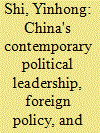

|
|
|
|
|
| Publication |
2011.
|
| Summary/Abstract |
There have been several profound features embedded in the contemporary Chinese political leadership, all having their roots in the Chinese centuries-long traditions or the modern/contemporary creative practice, together with their shaping impacts upon China's foreign policy or remarkable reflections in her external behavior. They are: reforms inherently differentiated; central idea of "maintenance", notion of "biological circle governing universe", paradox in the question of equality, the emphasis on morality, overwhelmingly domestic function of foreign policy, firm belief in the Chineseness per sue and its overwhelming importance, and political prudence in the perennial context of "Strong China, Weak China." China is facing enormous domestic historical challenges and substantial international pressure, while a generally peaceful China can be assured at least from her self-regarding realistic perspective.
|
|
|
|
|
|
|
|
|
|
|
|
|
|
|
|
| 2 |
ID:
107167
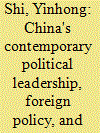

|
|
|
|
|
| Publication |
2011.
|
| Summary/Abstract |
There have been several profound features embedded in the contemporary Chinese political leadership, all having their roots in the Chinese centuries-long traditions or the modern/contemporary creative practice, together with their shaping impacts upon China's foreign policy or remarkable reflections in her external behavior. They are: reforms inherently differentiated; central idea of "maintenance", notion of "biological circle governing universe", paradox in the question of equality, the emphasis on morality, overwhelmingly domestic function of foreign policy, firm belief in the Chineseness per sue and its overwhelming importance, and political prudence in the perennial context of "Strong China, Weak China." China is facing enormous domestic historical challenges and substantial international pressure, while a generally peaceful China can be assured at least from her self-regarding realistic perspective.
|
|
|
|
|
|
|
|
|
|
|
|
|
|
|
|
| 3 |
ID:
166615
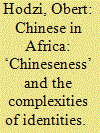

|
|
|
|
|
| Summary/Abstract |
This introduction presents background information to a special issue exploring the complexities of the Chinese identity and forms in which ‘Chineseness’ is expressed by Chinese migrants in Africa. Existing literature and media reports on the Chinese in Africa assumes that they are a homogenous group, this introductory article argues to the contrary. The Chinese diaspora in Africa range from descendants of migrants that settled in Africa in the seventeenth century to twenty-first century migrants. This historical and contemporary engagement between China and African countries is essential to understanding the diversity and hybridity of Chinese identity in Africa. This observation provides the basis for the six articles in this special issue. Based on ethnographic observation and in-depth interviews with the Chinese diaspora and locals in Zimbabwe, Ghana, Zambia and South Africa, the articles provide a compelling argument on why there is no single Chinese identity in Africa.
|
|
|
|
|
|
|
|
|
|
|
|
|
|
|
|
| 4 |
ID:
166620
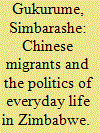

|
|
|
|
|
| Summary/Abstract |
While there has been a rapid migration of Chinese nationals to Zimbabwe following the ‘Look East’ policy, there has been little research on and about how the Chinese migrants relate and interact with locals and how they negotiate their social identities thereof. This paper examines Chinese small-scale traders in Harare, in particular their mundane forms of the everyday, with specific focus on their social and business practices, social relations and interactions with the locals. Drawing on qualitative ethnographic research with small-scale Chinese traders, workers and clients in Harare, this paper argues that as Chinese traders devise and deploy various tactics and strategies to adapt and get-by in the city of Harare, new and unique forms of Chineseness emerge akin to what some scholars referred to as ‘tactical cosmopolitanism’. The paper further reveals how Chinese mobility reconfigures the ways in which Chinese identities and Chineseness are enacted and articulated in Harare.
|
|
|
|
|
|
|
|
|
|
|
|
|
|
|
|
| 5 |
ID:
078523
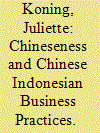

|
|
|
| 6 |
ID:
154719
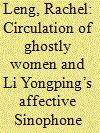

|
|
|
|
|
| Summary/Abstract |
Li Yongping’s writing displays an acute sensitivity to the changing cultural and historical positioning of the Sinophone Malaysian (Mahua) community and his own migratory experiences. This article focuses on Li’s incessant engagement with issues of gender and feminine sexuality in relation to the shifting biopolitical construction of a hybrid Sinophone Malaysian identity. Through an analysis of Li Yongping’s short story collection, The Snow Falls in Clouds (2002), I aim to examine how he deploys the trope of a prostitute figure to evoke the complexities of a Sinophone Malaysian identity and identification as a consistently reinvented affective product. Li’s keen awareness of the trafficking of desirable Chinese female bodies in Southeast Asia is inextricable from Sinophone Malaysia’s cultural history and community formation. Spectral feminine images reflect the increasingly porous and deterritorialized boundaries of citizenship, community, and nationalism complicating the concept of “Chineseness” and an affective Sinophone Malaysian subjectivity.
|
|
|
|
|
|
|
|
|
|
|
|
|
|
|
|
| 7 |
ID:
166092


|
|
|
|
|
| Summary/Abstract |
This article discusses the ongoing debates about classics reading (dujing 读经) in the revitalisation and diversification of Confucian classical education in mainland China. It begins by reviewing two disputes about dujing in modern Chinese history and then turns to the contemporary debate, focusing on how one professional and experienced practitioner expounded on the disparities in practicing classical education. The author summarises three controversial issues : (1) the relationship between the educative principles and methods, (2) historical legitimacy, and (3) the linguistic nature of Chinese language. Based on these, this paper reflects on the current dujing movement by concluding that the diversification of classical education has complicated the authenticity of “Chineseness” and rendered it a debatable public issue.
|
|
|
|
|
|
|
|
|
|
|
|
|
|
|
|
| 8 |
ID:
096479
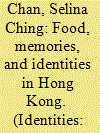

|
|
|
|
|
| Publication |
2010.
|
| Summary/Abstract |
This article adopts a processual and relational approach to study food remembrance and investigates how different ways of appropriating food reveal the politics of identities in Hong Kong. It examines how food memories reveal relationships between the past and the present, reflect epochal transformation, and mark changing identities of various groups of people through new ways of appropriations. It takes the case study of pancai, a special banquet food for the villagers in the New Territories of Hong Kong, to examine the relationships between food and identities. This article investigates how pancai is remembered, popularized, and reinvented with different variations and embodies shifting meanings for the New Territories inhabitants as well as other Hong Kong people in changing socioeconomic and political environments. Pancai has been imbued with multiple layers of significance, involving linkages between local and national, emigration and Chineseness, urbanization and rural heritage, as well as decolonization and identity politics. As identities are by nature negotiable, situational, and fluidic, pancai's multiple layers of meanings correspond to different levels of identities-identities of the New Territories inhabitants, the rest of the Hong Kong people, and the mainland Chinese.
|
|
|
|
|
|
|
|
|
|
|
|
|
|
|
|
| 9 |
ID:
173000
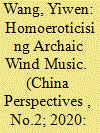

|
|
|
|
|
| Summary/Abstract |
This article explores Archaic Wind music (gufeng 古風) and its implications for Sinophone articulations. Gufeng can be categorised as a particular type of music with lyrical, musical, and symbolic references to ancient China that is produced, consumed, and circulated within an online fan community. While the lyrics of gufeng music express a post-loyalist yearning to return to the fictional roots of “Cultural China,” its video adaptations deconstruct the authenticity of such cultural roots in their homoerotic subtext. Exploring the audio-visual texts of the gufeng music, I suggest that it shows a rhizomatic return to ancient China that disorients the routes to the past.
|
|
|
|
|
|
|
|
|
|
|
|
|
|
|
|
| 10 |
ID:
147866
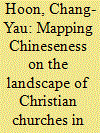

|
|
|
|
|
| Summary/Abstract |
Scholarship on the Chinese Indonesian community has largely been concerned with the tensions between the community and the majority non-Chinese (or pribumi). The fault lines were usually examined against the background of Suharto’s assimilation policy, the 1998 anti-Chinese riots, the stark imbalance of the nation’s wealth within this minority group, and Chinese loyalty – or chauvinism – in the time of nation-building, and in the face of the rise of modern China. Little attention has been given to Christianity as offering a shelter for the inconspicuous propagation of Chineseness; particularly in terms of the conduct of services in Chinese, the teaching of the language, and business-management leadership. The network of Chinese churches locally, and extending internationally beyond Indonesia, represents a rich field for further scholarship. This article sets out an epistemological map in the service of such research.
|
|
|
|
|
|
|
|
|
|
|
|
|
|
|
|
| 11 |
ID:
166616
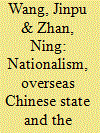

|
|
|
|
|
| Summary/Abstract |
This study aims at investigating the role of the expanding overseas Chinese state in the construction of ‘Chineseness’ among Chinese migrant entrepreneurs in Ghana. It focuses especially on the manifestation of the ideology of Chinese nationalism in the migrants’ living experience. Data analyzed in this study are primarily drawn from extensive interviews with private entrepreneurs, employees of Chinese state-owned enterprises and Chinese Embassy officials in Ghana. Besides, this study is supplemented by a content analysis of archive data collected from media reports, policy documents, online forums and social media. This study reveals that as an unintended consequence, private entrepreneurs enjoy tangible benefits from the expanding presence of overseas Chinese state in Ghana. Strategies and policies implemented by the Chinese government and its overseas representatives aiming at engaging Chinese diasporas also contribute to spreading nationalism and building a deterritorial Chinese identity.
|
|
|
|
|
|
|
|
|
|
|
|
|
|
|
|
| 12 |
ID:
093961
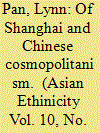

|
|
|
|
|
| Publication |
2009.
|
| Summary/Abstract |
Starting with the 2005 Chinese Heritage Centre exhibition 'Chinese More or Less' (for which I wrote the storyboard) - specifically with that part of the exhibition that profiles diasporic Chinese exemplars of different ways of combining cosmopolitanism with Chineseness - this paper attempts to respond to questions raised by Anthony Reid, viz: whether my moving from diaspora to Shanghai comes of 'Shanghai (re)joining the diasporic sense of Chinese modernity and post-modernity'; whether 'the diaspora no longer seems quite so distinctive once China is again an open and cosmopolitan place'; and whether I am still a 'Chinese Overseas' when I live in Shanghai.
|
|
|
|
|
|
|
|
|
|
|
|
|
|
|
|
| 13 |
ID:
192317
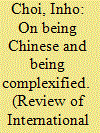

|
|
|
|
|
| Summary/Abstract |
While proponents of Chinese IR pursue a national school based on the identification of Chineseness with the Chinese national culture, its critics find a limited value in the ‘Chinese’ school as a mere temporary site for non-Western agencies. In contrast, I argue a distinctive and enduring Chinese IR is possible if it adopts a non-national and non-essentialised transcultural conception of Chineseness. This transcultural Chinese IR is based first on the contested and transcultural conception of Chineseness and second on the ontology of Chineseness as immanent humanity. Chineseness has been a fiction of a privileged descent from antiquity, which various contestants claimed by redefining the meaning of Chineseness. The shi elites, in particular, developed Chineseness as an aspirational ethos that propelled it to transcend its cultural boundary by incorporating foreign influences and thereby rendered Chineseness transcultural. Also, drawing on the ontological turn and Roy Wagner's work in anthropology, I show how Chineseness as immanent humanity transcends the category of culture, transforming the division of innate nature and constructed culture. The transcultural Chinese IR, with its own complexity and universal aspiration, uses its history and ontology to complexify both its tradition internally and other IR traditions externally, promoting the pluralisation of IR.
|
|
|
|
|
|
|
|
|
|
|
|
|
|
|
|
| 14 |
ID:
190769
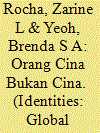

|
|
|
|
|
| Summary/Abstract |
This paper explores how being Peranakan is related to (not) being Chinese in Singapore, intertwining descent, racial categorization, cultural practice and choice. Tracing the complex history of Peranakan identity, it highlights how the social construction of race has created a hybrid yet ethnically Chinese identity, with a rich cultural heritage largely relegated to the past. Drawing on theories of racial formation and the racial state, this study illuminates racial ascription and categorization in Singapore. Interviews with 32 Peranakan individuals highlight the positioning of Peranakan identity within the multiracial framework, subsumed within the Chinese category. Examining the idea of being ‘Orang Cina Bukan Cina/Chinese but not Chinese’, the paper addresses nuances of locating the mixedness of hybridity in a racially structured context. Juxtaposed against the recent revitalization of Peranakan material culture, Peranakan as ‘locally born’ illustrates how this complex identity is used in everyday life by individuals and the state.
|
|
|
|
|
|
|
|
|
|
|
|
|
|
|
|
| 15 |
ID:
137522
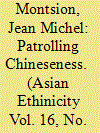

|
|
|
|
|
| Summary/Abstract |
In combination with their strategy to recruit foreign talent, Singaporean state authorities have increasingly focused their attention on community integration schemes for Chinese professional newcomers. The government facilitated such integration with the creation of the Kowloon Club in 1990. The Kowloon Club is not only a government experiment that has been repeated three times since then, but also the only new migrant association that does not explicitly target Mainlanders. Through in-depth interviews with the Club’s leadership, I explore the ethnic adaptation of the Kowloon Club membership as it negotiates the evolving sense of Chineseness found in state designs and Singaporean society. Much like the emergence of the 1997 Hong Kongese identity, the Kowloon Club’s activities have shifted in strong reaction to the racialized category put forth by state authorities and embodied by Mainlander professionals in that the Club’s activities now symbolize and help patrol what Chineseness means as everyday performance in the city-state.
|
|
|
|
|
|
|
|
|
|
|
|
|
|
|
|
| 16 |
ID:
093963
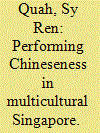

|
|
|
|
|
| Publication |
2009.
|
| Summary/Abstract |
Chinese Singaporeans in different eras perceive their identity as a Chinese very differently, both with regards to historical specificities and in the context of a multicultural Singapore. Through the discussion of various literary and cultural texts, this article aims to rethink how the concept and perception of Chineseness change over half a century, in relations to Singapore's multicultural society, and especially to the presence of China, ideologically, psychologically and economically.
|
|
|
|
|
|
|
|
|
|
|
|
|
|
|
|
| 17 |
ID:
173170
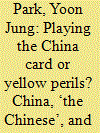

|
|
|
|
|
| Summary/Abstract |
Over the past several years there have been a number of racially-tinged incidents in South Africa involving ‘the Chinese.’ Simultaneously, the love affair between Chinese and South African government leaders has expanded to include local Chinese community leaders and local ANC officials. Based on ongoing research on Chinese communities in South Africa I examine these conflicting phenomena and explore the various ways in which the three main ethnic Chinese communities – Chinese South African, Taiwanese South African, and mainland Chinese migrant – and other South Africans respond to these often conflicting social and political messages. I argue that China’s global ascendance and South Africa’s increasing national-level dependence on China encourages some actors (both Chinese and non-Chinese) to opportunistically wield the China card while other non-Chinese South Africans respond with fear and racism, invoking Yellow Peril narratives.
|
|
|
|
|
|
|
|
|
|
|
|
|
|
|
|
| 18 |
ID:
158091
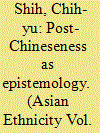

|
|
|
|
|
| Summary/Abstract |
The current study relies on the social psychological notion of altercasting and the anthropological notion of post-Chineseness to appreciate the identity strategies of the Philippine’s China watchers. Basically, the case study suggests that the attainment of the sympathetic capacity to understand China can enrich the knowledge of those China watchers coming from an external position. However, adhering to an internal position of China watching would disempower ethnic Chinese scholars in the Philippines in fully participating in the indigenous community. Therefore, in the long run, the trend is for all ethnic scholars to establish distance from internal perspectives on China and practice watching China from the outside from time to time.
|
|
|
|
|
|
|
|
|
|
|
|
|
|
|
|
| 19 |
ID:
172999
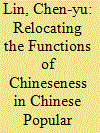

|
|
|
|
|
| Summary/Abstract |
While the popularity of China Wind (zhongguofeng 中國風) music during the 2000s has waned somewhat since its peak, the notion of Chineseness in popular music requires reconfiguration. In the world of popular music, transnational flows of culture, migration, and capital have created various forms of Chineseness with different functions. This article examines two ways in which the perception of Chineseness functions in the music industry, namely as a re-centred Chineseness in the creative industries, and Chineseness as a globalising project, by examining the internationally franchised televised music contest The Voice of China and the recent work of two artists known for their China Wind songs, Jay Chou and Wang Leehom. Through textual analysis of media content and songs, as well interviews with industry practitioners, this article argues that Chineseness in today’s Chinese popular music is often shaped by markets, industrial practices, media censorship, state policy, and cross-industry convergence, and musicians’ artistry increasingly plays a part in forming and authorising the representation of Chineseness in contemporary Chinese popular music.
|
|
|
|
|
|
|
|
|
|
|
|
|
|
|
|
| 20 |
ID:
137518
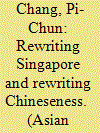

|
|
|
|
|
| Summary/Abstract |
This study proposes to view Lee Guan Kin (the former director of the Center for Chinese Language, Culture, and Division of Chinese at Nanyang Technological University) in the historical context in which the identity of Southeast Asian Chinese has transformed from overseas Chinese to ethnic Chinese, from Straits Chinese to Chinese Singaporeans. Based on the interview with Lee and the study of Lee’s numerous publications, this article exemplifies Lee’s enduring efforts on researching diasporic Southeast Asian Chinese and their ties with Chinese language and culture is a meaningful choice rather than an essentialist returning to ‘roots.’ In this article, Lee’s continuous engagement with China, Chinese language, and culture is illustrated by analyzing Lee’s assertion of ‘doing justice’ for Lim Boon Keng and Tan Lark Sye. Accordingly, this study is divided into four parts. First, the concept of Chineseness is reviewed and explored in the context of Southeast Asia. Second, the historical background of English-educated and Chinese-educated Chinese groups and their varying degrees of Chineseness are introduced. Then this study analyzes how Lee does justice for Lim Boon Keng, a baba who served as chancellor of Xiamen University for 16 years, and Tan Lark Sye, who was the founder of former Nanyang University. Lee believes that both prominent figures were unfairly and relentlessly treated by Chinese and Singaporean historiography, respectively, and therefore, Lee wants to do justice to them as a way to relocate their position in the context of Chinese diaspora and to redefine Chinese accordingly. Finally, this study argues that locality defines Lee’s Chineseness, her relation with China, China studies, Chinese identity, or Chinese culture. While locality defines Lee’s Chineseness, a diasporic stance characterizes her articulation, which challenged the homogeneous threat of identity imposed by the nation-state and the kind of Chineseness traditionally shaped by the authority of a sino-centric core.
|
|
|
|
|
|
|
|
|
|
|
|
|
|
|
|
|
|
|
|
|